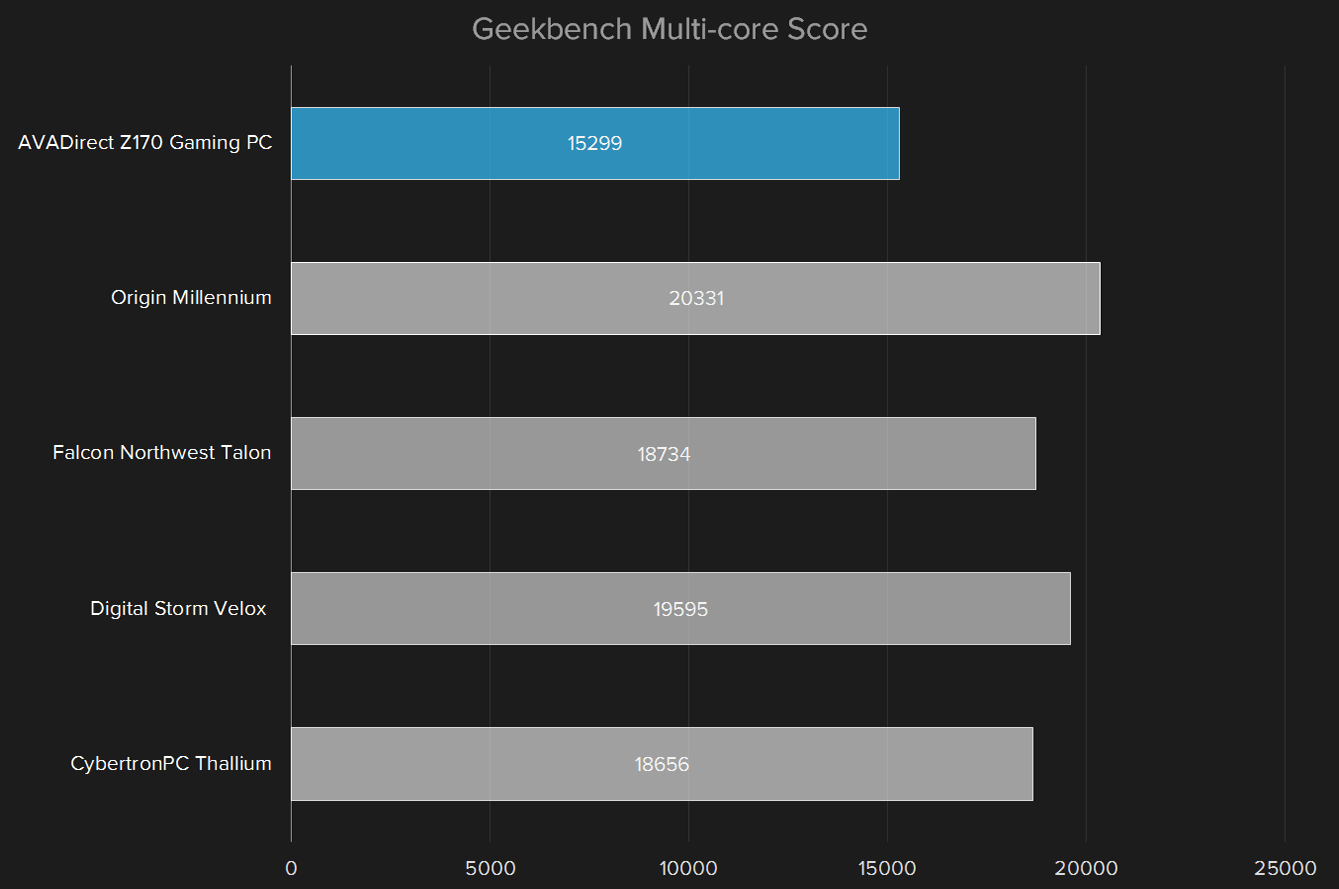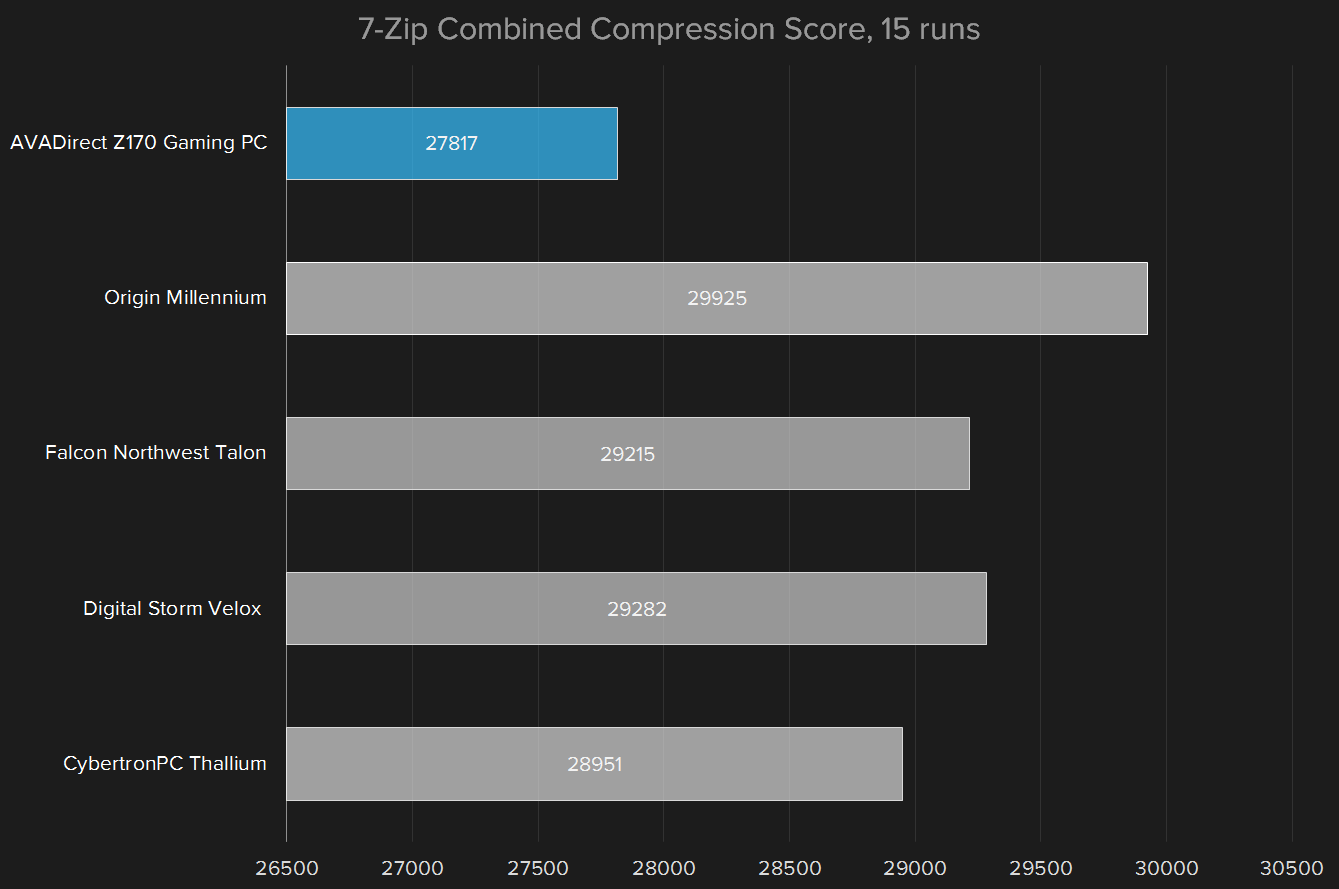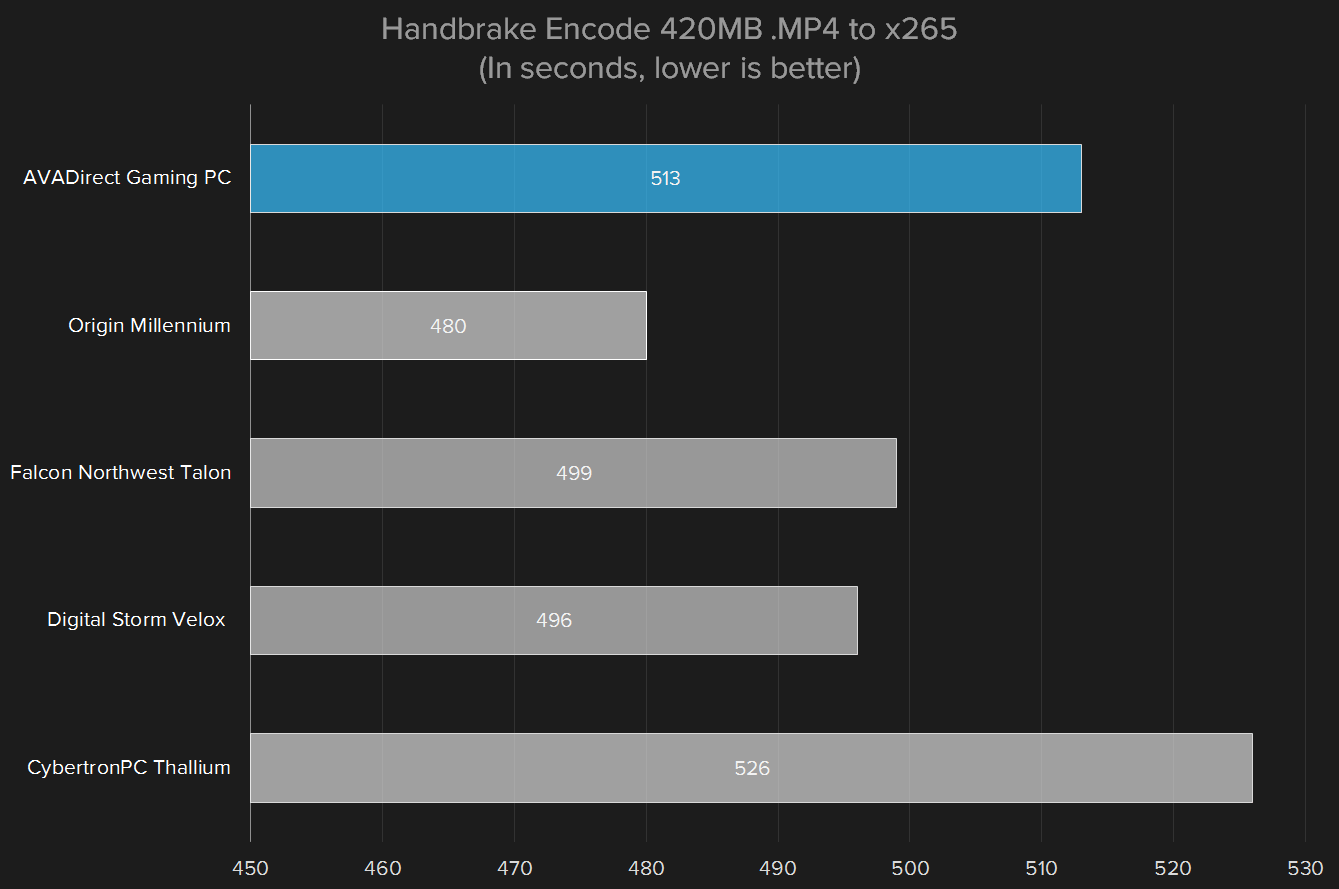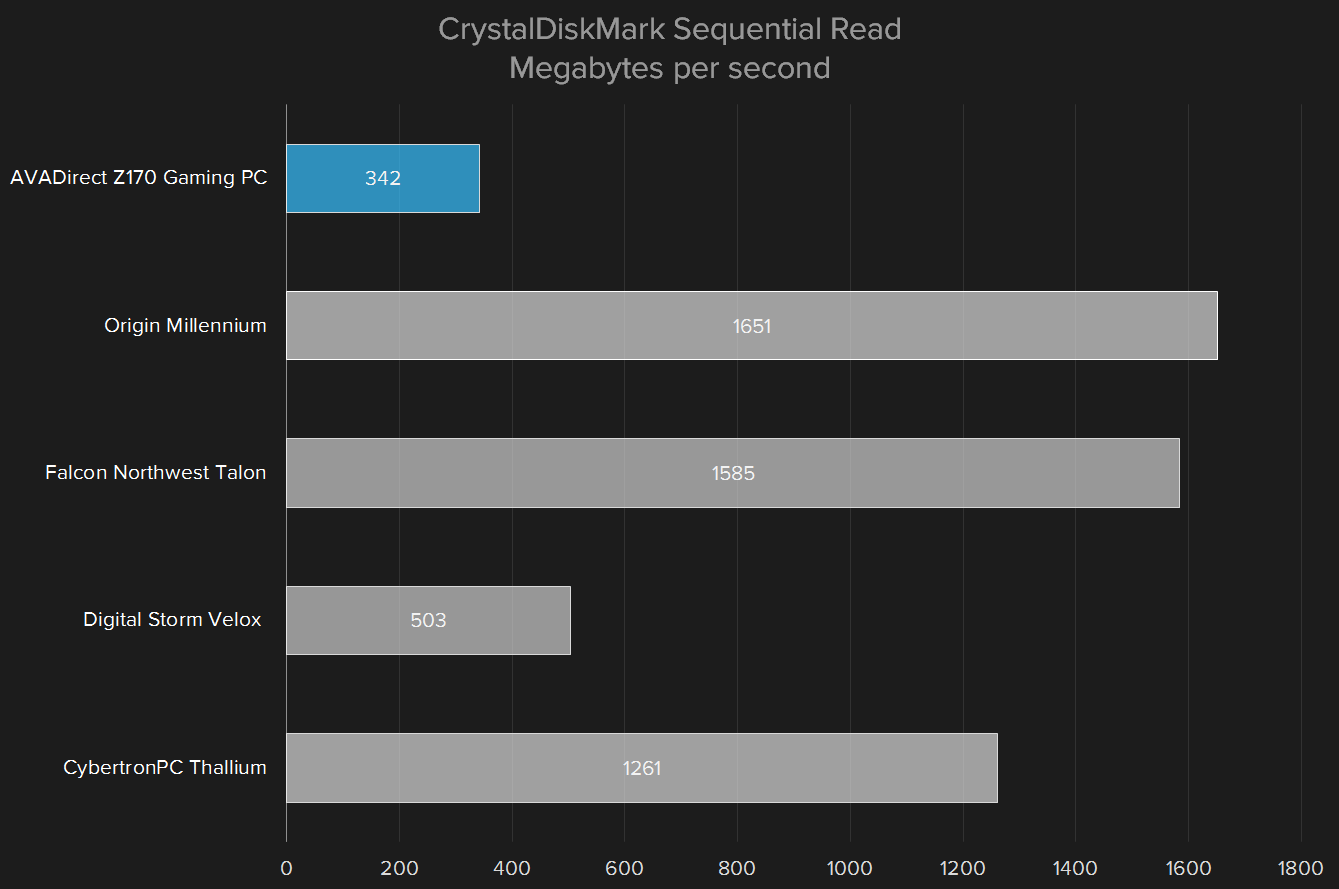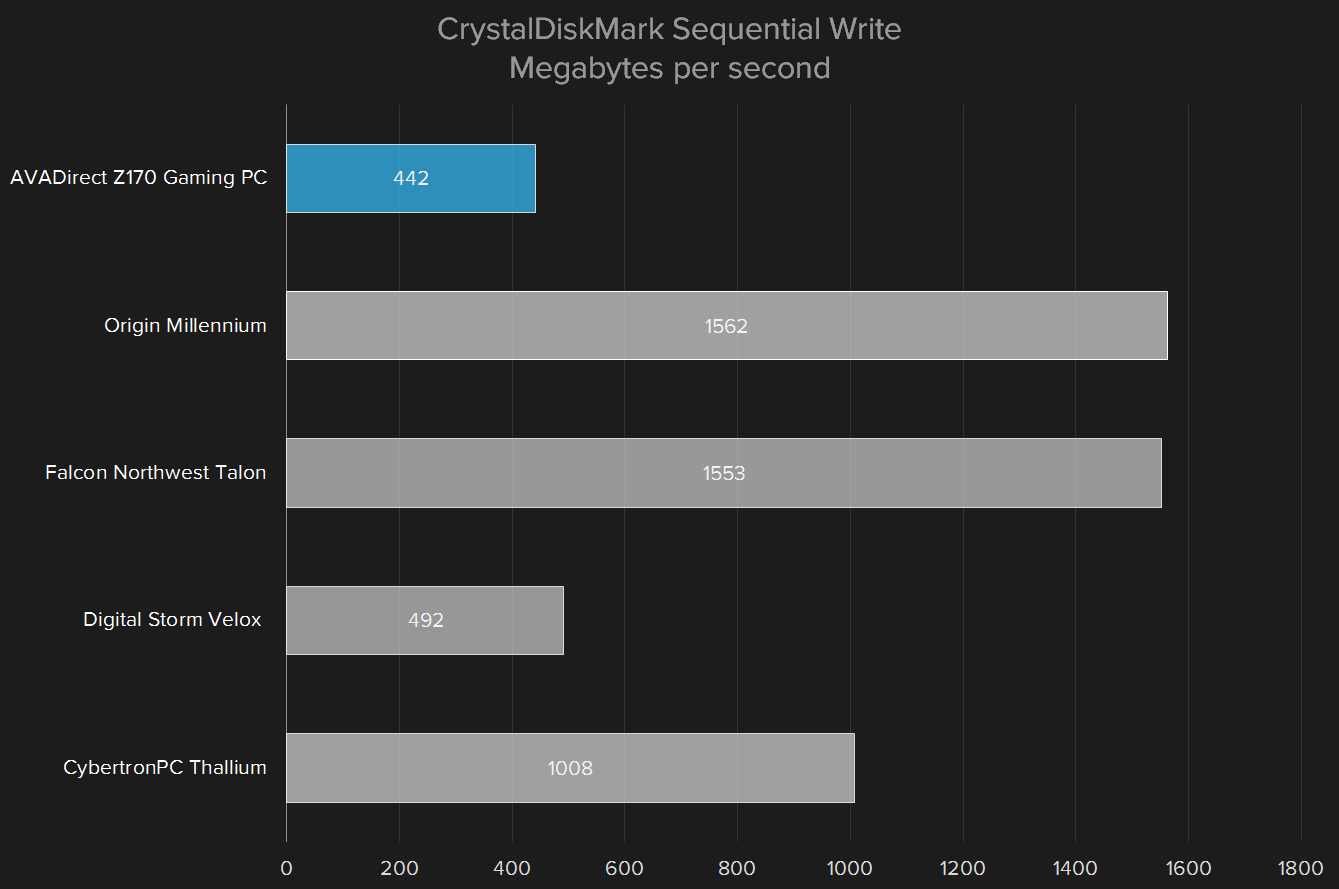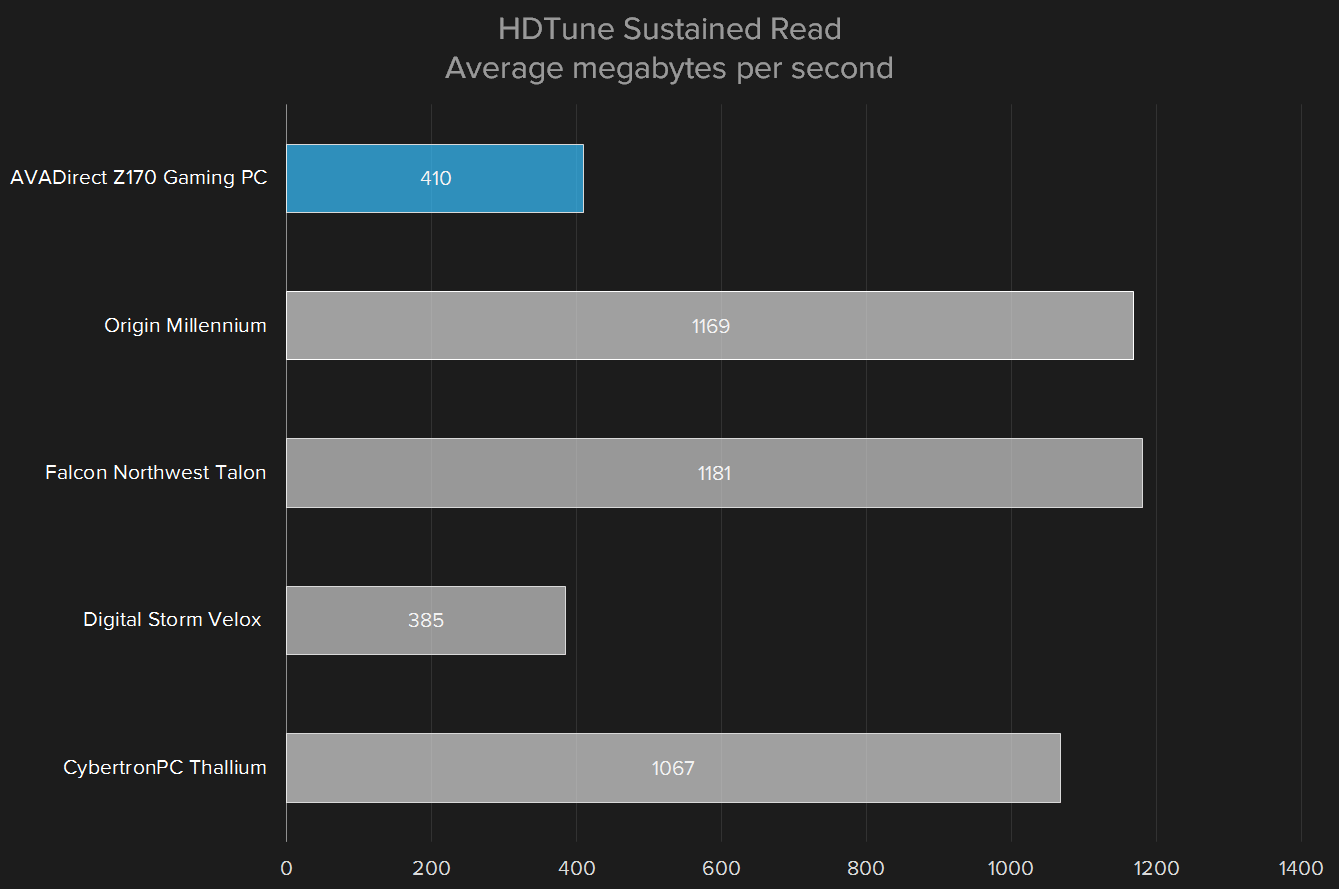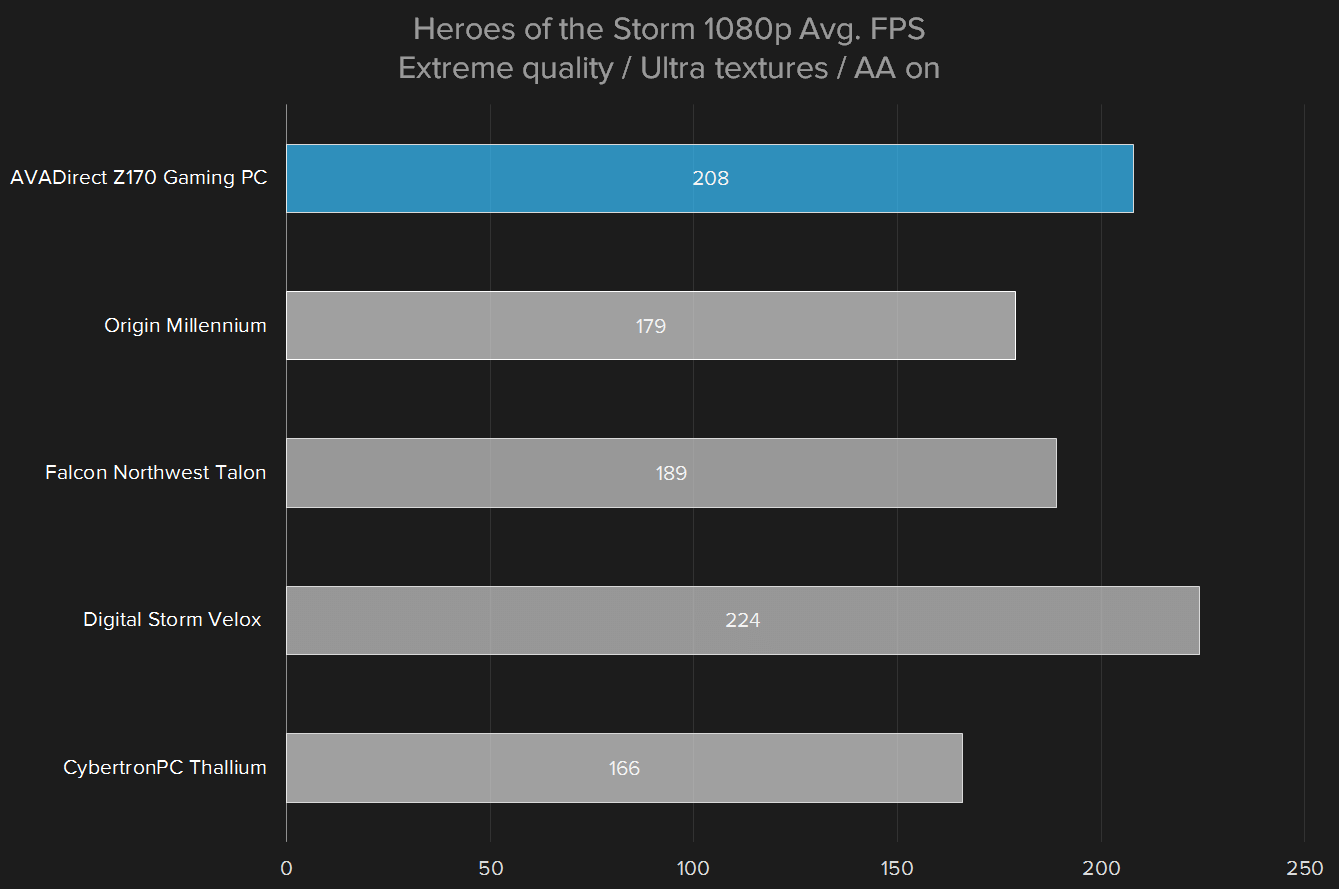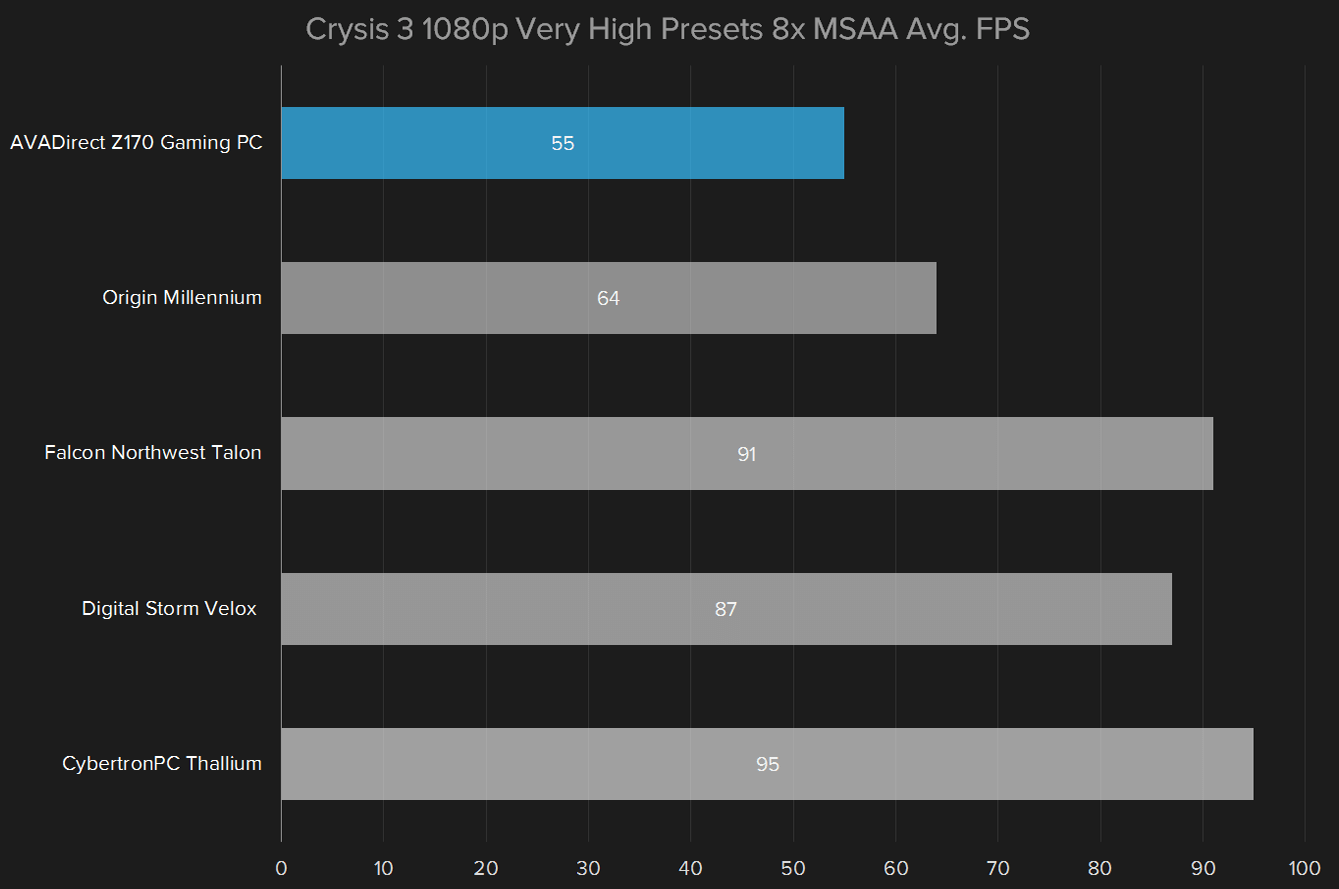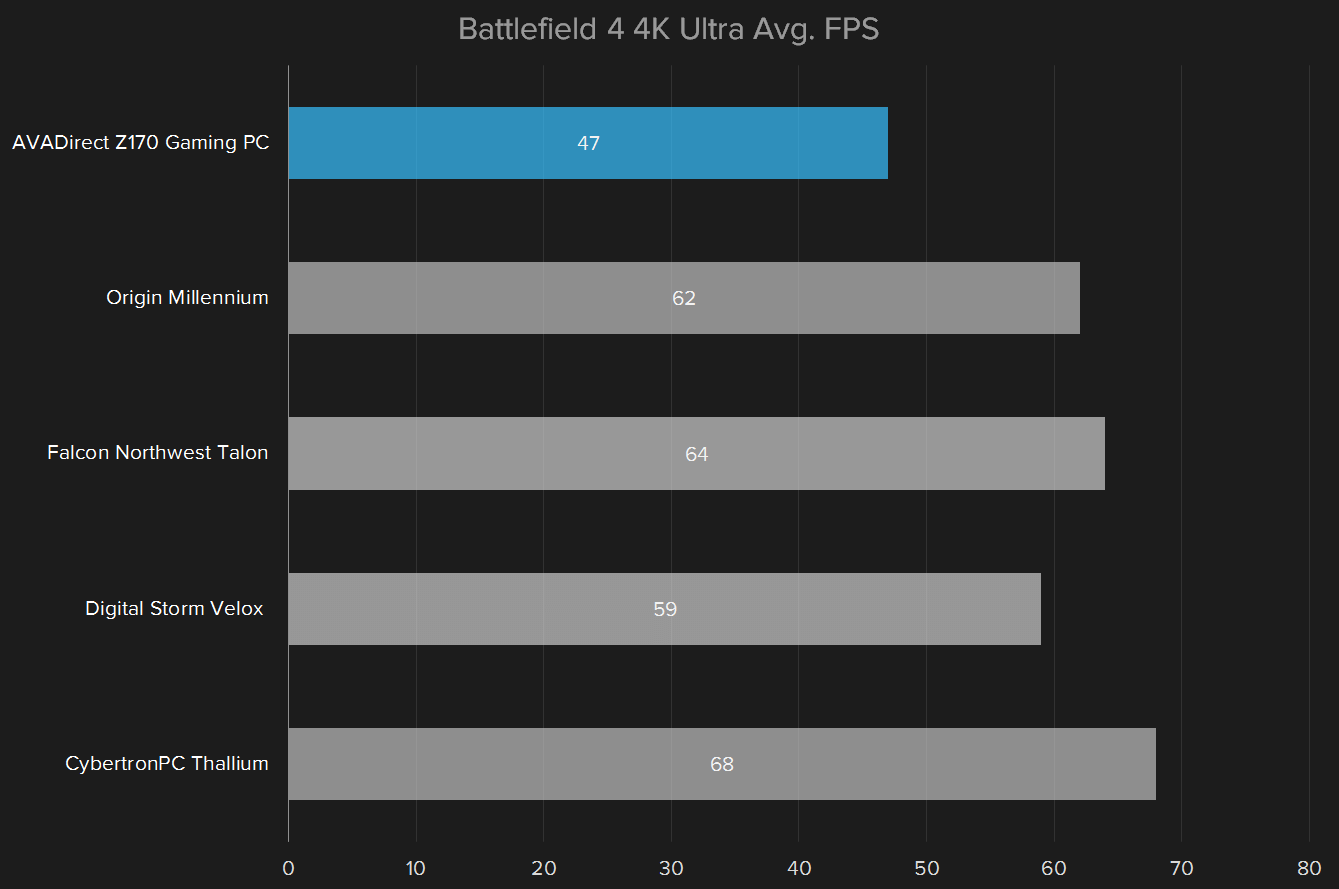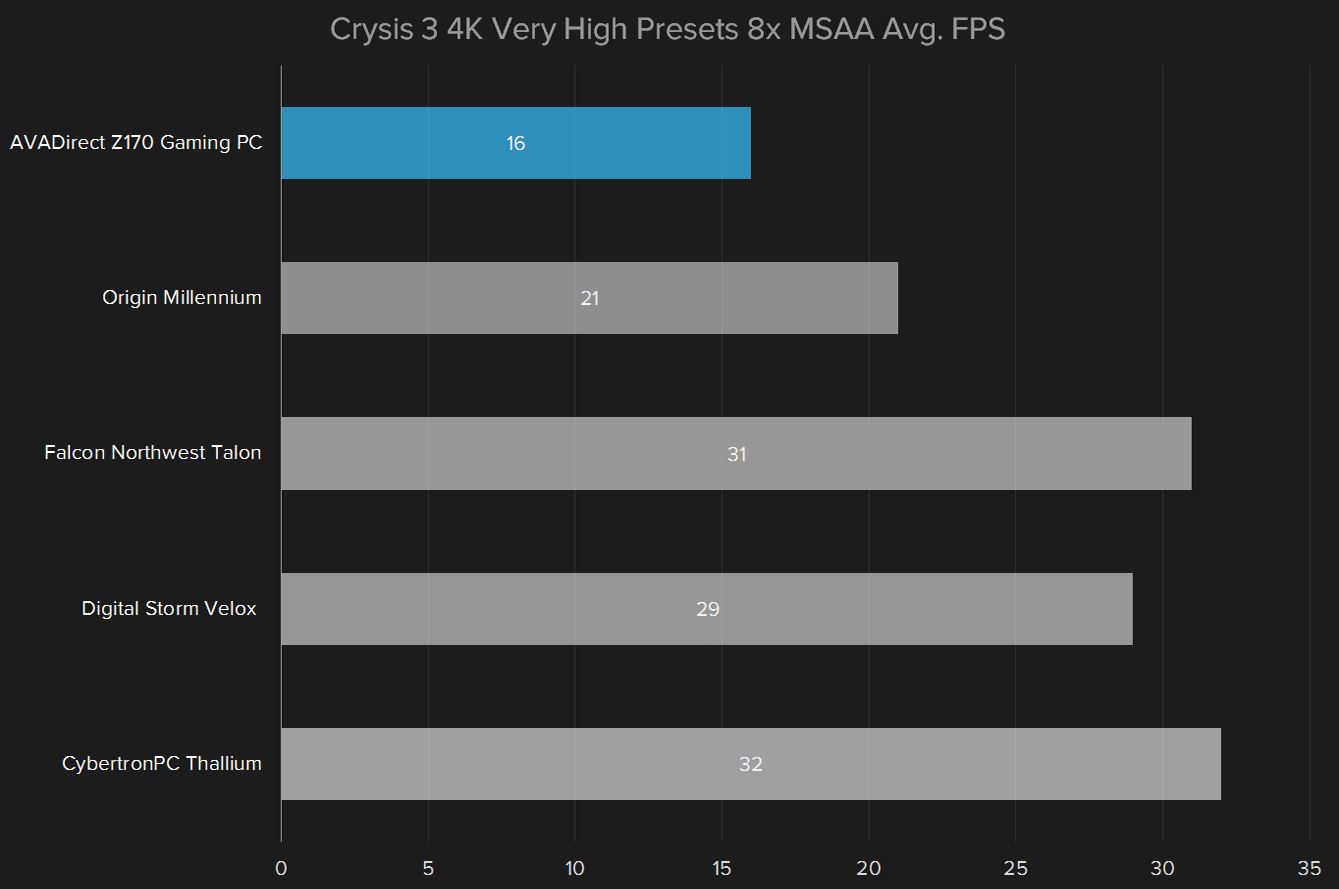“AVADirect’s Z170 Gaming PC targets maximum performance per dollar, and hits the mark.”
- Attractive enclosure
- Easy to upgrade
- Good performance value
- Three year warranty
- Build quality could be better
- Loud at full system load
Gaming is the average desktop’s crucible. There are many tasks that can put even the most powerful rig to the test, but gaming is the only one an average Joe is likely to embark on. Most people will never edit a 4K movie, or encrypt an entire hard drive, or batch edit ten thousand photos. Many will, at some point, sit down to play a game – and find their system’s not worthy.
That often leads to an over-reaction. As players dig deeper into gaming, they become more and more obsessed with the hardware, leading to insanely priced builds. Dream rigs like Origin’s Millennium are wonderful technical achievements, but also overkill for anything aside from playing at 4K resolution.
AVADirect, by contrast, decided to take a more balanced approach when it built our Z170 review unit. The review unit shipped does have a Core i7-6700K, a liquid cooler, and 16GB of RAM, but its other specifications are more modest – and practical. Rather than rely on SLI, it arrived with a single GTX 980 Ti, and the 1TB solid state drive is a mid-range model that balances storage and performance.
That results in a price tag of $2,700, and while that’s not cheap, it’s relatively affordable for a top-tier gaming rig. Does this modest tower do enough to define itself, or is it a middling option in a crowded space?
Off the shelf
Our review unit arrived in a BitFenix Pandora mid-tower, which AVADirect uses for several of its smaller systems. Despite the use of the “mid-tower” term, the Pandora is small, measuring about 16 inches in length and height, and just 6 inches across. It’s not as small as a Digital Storm Bolt or a Falcon Northwest Tiki, but it’s mid-way between those tiny systems and a normal gaming tower.
The Pandora’s look is elegant and mysterious. Metallic side panels, the typical choice for luxurious enclosure, provide a touch of class, but the curved front is what really sets the case apart. This is quite unique, and the Pandora goes a step further by integrating the left and right case panels into the front façade, adding depth to the design. AVADirect sacrifices the optical drive as a result, but hardcore gamers likely won’t mind – everyone downloads games from Steam, anyway.
While it looks great, the enclosure is an off-the-shelf model (company logo aside), and has the usual shortcomings. The side panels come off so easily that they feel a bit cheap, and the top fan grill pops loose at the slightest touch. These are features, not bugs. Such touches make upgrading easier. Yet they also feel out of place on a system from a high-price manufacturer.
Build quality could be better. The white LED strips that ring the case window, held on by adhesive, lost their strength and began to sag within a few weeks. We also noticed several loose, unused power connectors sticking out of a hard drive bay, where many other such connectors were nested. That’s not a functional problem, but most competitors use elaborate zip-tie configurations and hidden case compartments to better hide unused wires.
Connectivity is adequate. The top panel has two USB 3.0 ports and 3.5mm jacks for a headphone and microphone. That’s on par with competing rigs of similar size. Strangely, the audio jacks aren’t labeled, which can cause confusion the first time the system is used.
Small, yet easy to upgrade
Unusually sleek, the AVADirect Z170’s enclosure looks cramped, but in fact it’s utterly conventional and rather spacious. The system has a conventional layout, with motherboard ports facing rearward and the power supply at the bottom. Intake fans are mounted at the front, one of which handles the CPU liquid cooler’s radiator, and exhaust fans are mounted at the top. Absolutely everything is visible through the system’s case window, which means everything is easy to access. All you need is a screwdriver.
The white LED strips that ring the case window began to sag within a few weeks.
The AVADirect Z170’s Pandora enclosure provides reasonable upgradability. It supports Micro ATX and Mini-ITX boards. Five hard drive bays are included and, in a forward-thinking move, the majority are the 2.5-inch format favored by solid state drives. All the cooling fans supported are taken up by default.
This system is more upgradable than a slimmer alternative like the Falcon Northwest Tiki, but not quite as capacious as most mid-towers. I think it’s a great balance. Gamers don’t need a huge hard drive bay or even a full ATX board, and the cooling offered is more than adequate.
Overclocked, yet behind the competition
AVADirect’s Z170 Gaming PC arrived with an Intel Core i7-6700K processor overclocked from 4GHz to 4.5GHz, paired with 16GB of memory. While the extra 500MHz is appreciated, the system’s clock speed is behind other recently tested Skylake gaming rigs, which were overclocked to between 4.6GHz and 4.8GHz. That showed in benchmarks.
The results are expected. At 4.5GHz, this rig can’t keep up with others that have the same processor, but run at a higher clock speed. The AVADirect Z170 Gaming PC came last in every benchmark but Handbrake, where it was second to last.
Still, the added boost does make the system a fair bit quicker than it would be at stock speeds. The Core i7-6700K scored 3,898 in Geekbench single-core when we reviewed it earlier this year. The AVADirect’s score of 4,574 represents an improvement of about 20 percent. Also keep in mind that the configuration we reviewed, at $2,700, is about $1,300 less than the rigs we tested in our Skylake desktop round-up.
Capacity over performance
Our review unit arrived with a Crucial BX100 SSD. If you know about solid state drives, then you know it’s not a particularly exciting unit. The SATA drive is designed to balance performance with price, which puts it at a major disadvantaged relative to other desktops we’ve recently reviewed.
Ouch, right? This drive is way behind the quickest available – in fact, it’s over four times slower than the Samsung 951, which powered the Falcon Northwest Talon and Origin Millennium to their absurd scores. But remember – the Crucial is a single, one terabyte hard drive. The Falcon and Origin systems offer half the capacity despite the fact each sell for over a grand more.
It’s arguable that, despite its performance, the Crucial is actually a more sensible choice. A fast SSD will marginally reduce load times, but it has no relevance to performance in-game. AVADirect’s decision to go with a slower, fatter drive is part of why this system is less expensive than rivals, and ensures users won’t run out of space any time soon.
A lone GTX 980 Ti makes its stand
And so we come to the most important part of the AVADirect’s performance story. The processor and the hard drive, while important, only account for a small portion of game performance. Most responsibility falls on the graphics card.
This rig can easily handle any game at 1080p.
3DMark turned in a score of 13,870 in Fire Strike, which is about as high as any single video card can manage without overclocking. The only quicker card is Nvidia GTX Titan, but it’s only slightly faster, and costs twice as much.
Let’s dive into the games.
1080p gaming benchmarks
While 1080p remains the most popular resolution for gaming (according to the Steam hardware survey) it’s no longer challenging for most cards. The GTX 980 Ti, the second quickest card in Nvidia’s arsenal, makes easy work of most games in our suite, even at maximum settings.
As you can see, the only game that posed any real challenge is Crysis 3 at maximum detail. It averaged 55 frames per second, which is below the ideal target of 55, but close enough that it shouldn’t be a bother. The other games tested, Heroes of the Storm and Battlefield 4¸ easily cleared 100 FPS.
Again, the AVADirect does come at the bottom of the pack when compared to other systems we’ve recently tested, but most of them equipped two GTX 980 Ti cards. Obviously, that provides an edge – but at 1080p it doesn’t much matter. The Z170 Gaming PC is more than capable of playing any game at this resolution, even with every detail turned up.
4K gaming benchmarks
Now it’s time to turn up the heat. 4K resolution contains four times the pixels of 1080p. That’s a bit of a problem for any single video card, even if it’s a GTX 980 Ti.
There’s a mix of good and bad news here. The good news is that Heroes of the Storm actually plays as well as any of the dual-card configurations, and while there’s more of a drop in Battlefield 4, the AVADirect Z170 PC Gaming is no more than 30 percent slower. Not bad, considering it has half the GPU grunt to work with.
And then Crysis 3 has to pop in and crash the party. Unlike the other titles we tested, Crysis scales almost perfectly in SLI, so the single GTX 980 Ti hits just 16 frames per second at maximum detail – exactly half as quick as rigs with two GTX 980 Ti cards.
These results show the AVADirect can handle 4K gaming in a pinch, particularly if you play less demanding titles, or turn down detail a bit. The rig is most comfortable at 1080p or 1440p, however, and you shouldn’t buy it – or any competitor with a single 980 Ti – if 4K gaming is your goal.
Noisy, but energy conscious
Performance and power draw are different sides of the same coin. The quicker the rig, the more fuel it needs. That means the AVADirect, which is more modest than some competitors, also draws a lot less juice.
We recorded 76 watts of draw at idle, and no more than 369 watts at full system load. Most of the Skylake desktops we’ve reviewed drew around the same at idle, though the Cybertron PC Thallium and Falcon Northwest Talon exceed 80 and 90 watts, respectively.
Heavy load is where the Z170 Gaming PC has a real edge. Many competitors we’ve tested drew over 650 watts. Why? Simple – they had two video cards. But even the Origin Millennium Battlebox drew 394 watts, a fair bit more than the AVADirect.
The system generates a lot of fan noise despite its (relatively) low power draw. We measured 41.5 decibels of output at idle, and up to 48.2dB at load. That’s over ten decibels louder than the quietest Skylake desktop we’ve reviewed, the Origin Millennium, and several decibels noisier than other recently tested rigs.
Warranty
AVADirect systems are usually covered under warranty for a single year, but the configuration we reviewed was quoted with a three-year warranty that covers parts replacement and labor. That adds a lot of value to the system. The company also offers lifetime technical support, which is typical among small PC makers.
Conclusion
The DT Accessory Pack
Up your game and the get the most out of your gear with the following extras, hand-picked by our editors:
Asus ROG Swift PG278Q G-Sync monitor ($670)
This 1440p gaming monitor offer G-Sync, making it a great to pair with the AVADirect Z170 Gaming PC.
Logitech G502 Proteus Gaming Mouse ($60)
Gaming requires a precision mouse, and the Logitech G502 offers that without a stratospheric price tag.
SteelSeries Siberia Elite Gaming Headset ($162)
Need to keep in touch with your fellow gamers? The Siberia can do that while pumping out high-quality Dolby 7.1 sound.
Clearly, the AVADirect Z170 Gaming PC entered this review with a bit of a handicap. Its specifications are inferior to many other Skylake systems we’ve reviewed, so it of course loses in many benchmarks. But the rig is also far more affordable at just $2,700. That leaves just one question. Is the AVADirect a good value?
To find out we configured similar systems from other companies, including the three-year warranty bundled as part of our test rig’s specifications. Origin’s Chronos rang up to $3,037, the Digital Storm Eclipse is $2,991, and the Falcon Northwest Talon sits atop the pile at $3,230. That’s a difference of between $300 and $500. That gives the AVADirect an advantage, and it’s an excellent choice if performance-per-dollar is the main concern.
Overall quality is sacrificed to provide that value. Our review unit suffered a saggy strip of LED lighting, poor location of spare internal connectors, and lagged behind the overclocking achieved by competitors. These problems will annoy gamers with an eye for detail. If you can forgive such flaws, though, the AVADirect Z170 Gaming PC will deliver you to gaming nirvana.
Highs
- Attractive enclosure
- Easy to upgrade
- Good performance value
- Three year warranty
Lows
- Build quality could be better
- Loud at full system load






